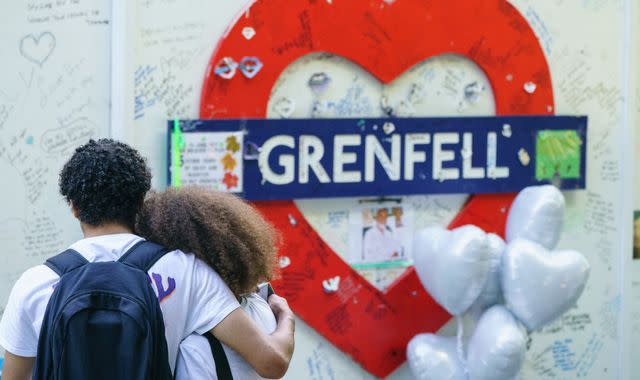Government accused of 'putting disabled people's lives at risk' by failing to implement Grenfell Inquiry recommendations

The government has been accused of 'putting disabled people's lives at risk' by failing to implement all of the recommendations from the Grenfell Inquiry - as the London Fire Brigade (LFB) says it has met all improvements required of it.
The LFB was criticised by inquiry chair Sir Martin Moore-Bick in 2019 for failings in equipment, training and management.
The retired judge praised the bravery of individual firefighters, but found the organisation's response had been "gravely inadequate," saying fewer people would have died if they had evacuated the building sooner.
He gave the brigade 29 recommendations, all of which have now been met.
Grenfell Tower six years on: 'Frustration over lack of change is turning to anger'
Commissioner Andy Roe praised his team for the achievement, saying hundreds of lives have been saved by the new equipment and policies, but warned that many buildings are still unsafe from the ongoing cladding crisis.
"I think it's unacceptable that we have 1,250 buildings that still require some sort of remediation in London, and I would take the opportunity to urge building owners and managers, particularly, to fix it, to do the right thing."
When asked if the thought kept him up at night, he said: "Yes, of course, because that's my firefighters operating in those buildings, and there are hundreds of thousands of Londoners living in them."
The LFB's landmark moment puts more focus on the government's own, incomplete, recommendations.
Evacuation plans 'make moral sense'
They say, of the 15 recommendations directed at government in Phase 1 of the Grenfell Tower Inquiry, they have completed 11 and "work continues on the remaining four".
Among those outstanding is a request to force building owners and managers to make and keep 'Personal Emergency Evacuation Plans', known as PEEPS, for all disabled residents in high-rise blocks.
Adam Gabsi is a wheelchair user, living on the 6th floor of a tower block with Grenfell-style cladding.
He had to fight to get a PEEP, alongside changes to the building, which will allow him to escape in the event of a fire.
He said: "I'd say to the government: 'You can put a value on my tenancy, but you can't put a value on my life'.
"How does it make sense that PEEPs have been recommended by the Grenfell inquiry, but are not in place?
"Anyone could live in a high rise and become disabled tomorrow. It just makes moral sense to have evacuation plans in place."
Read more on Sky News:
Children to no longer be prescribed puberty blockers
Police launch appeal for woman, 19, last seen three weeks ago
'Can't ever let that happen again'
Some 41% of the people living in Grenfell with a disability lost their lives in the fire and for Ed Daffarn, a former resident and member of the Grenfell Committee, disabled people are still at risk seven years on.
He says their lives are being put at risk because of "financial considerations".
The government previously indicated that it would not be enforcing PEEPs amid concerns about practicality and cost.
"My feeling is the government hasn't looked at it independently, and that they're more worried about cost implications," said Mr Daffarn.
"But, it was cost implications that caused Grenfell in the first place, and we can't ever let that happen again.
"It's so important that recommendations made by all public inquiries are followed through, and that there is an oversight body to ensure that that happens."
A Home Office spokesperson said the government remains "wholly committed to putting measures in place to ensure a tragedy like the Grenfell Tower fire never happens again.
"We are also currently considering responses to our consultation on personal evacuation plans to determine how best to deliver against the inquiry's recommendations. A government response to that consultation will be published in due course."


